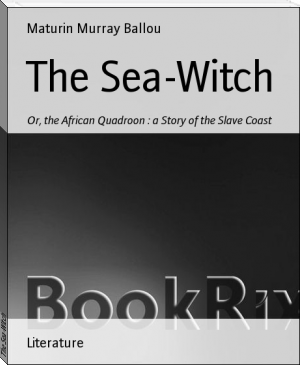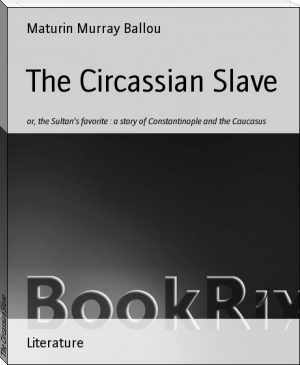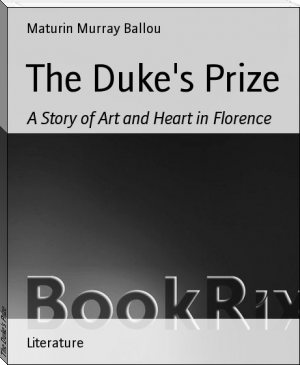The Sea-Witch by Maturin Murray Ballou (english novels for students .TXT) 📕

- Author: Maturin Murray Ballou
- Performer: -
Book online «The Sea-Witch by Maturin Murray Ballou (english novels for students .TXT) 📕». Author Maturin Murray Ballou
“May, you have not asked me if I saw the mysterious fireman last night?”
May could not trust her voice to reply.
“He was at the fire.”
“Was he?”
“I tell you he was,” returned Hal, pettishly. “When I say he was, I do not mean that he was not. I followed him after the fire.”
“Did you?”
“Good heavens, you will drive me mad!” Hal sprang to his feet. “I followed him I say—ay, to the death!”
Then ensued a rapid recital of all that had passed, Hal was excited beyond endurance, every nerve was stretched to its utmost, and the purple veins stood out boldly on his white forehead. He did not wait for May to say a word, but abruptly ended his narrative with:
“Was not this a pretty way to reward him for saving the life of my cousin—my sister. O, God, must the roar of that terrible whirlpool ring in my ears forever?” He gazed a moment on May’s countenance of speechless sorrow, and rushed from the room.
For a long time Hal and May scarcely spoke to each other. He felt as though he had wronged her, and was always restless in her society. He would not bear to receive the thousand cousinly attentions which May had always lavished on him, and which she now performed mechanically; he hated to see the suppers by the corner of the grate, and after a few evenings would not notice them; but above all he could not endure that very, very sad expression in May’s eyes—for worlds he would have wished not to be able to translate it. The time for his wedding was fast drawing nigh, and he knew he should be miserable if May did not smile upon his bridal.
Weeks passed, and Delancey did not go to a fire; he paid his fines and remained at home. But he could not sleep while the bells were ringing—somehow they reminded him of that still night at Hurl Gate. By degrees the coldness wore off between May and himself, and she consented to be Emily’s, his Emily’s bridesmaid.
One night, however, the bell had a solemn summons in it, which Hal could not resist. It tolled as though for a funeral, and spoke to his very heart. He threw on his fire-clothes and hastened down town. Delancey soon reached the scene of destruction. The flames were carousing in all their mad mirth, as though they were to be the cause of no sorrow, no pain, no death. Hal’s courage was soon excited; he leaped upon the burning rafters, rescuing goods from destruction, telling where a stream was needed; but suddenly he became paralyzed—he heard a voice which had often rung in his ear amid like scenes, a greater genius than his own was at work. He learned that he was innocent, even indirectly, of the stranger’s death. Joy thrilled through every vein, he could have faced any peril, however great. Regardless of the angry blaze, he made his way through fire and smoke to the stranger’s side. The fireman paused in his labor a moment, grasped Hal’s hand, and with a smile, in which mingled a dash of triumph, said:
“You see I am safe.”
“Do you forgive my rudeness?” asked Hal.
“Entirely!” was the ready response, and they went to work again.
In a few minutes Hal was separated from his friend—for he felt that he was his friend, and could have worked at his side until his last strength was expended. Retiring from the burning building to gather new vigor for the conflict, a sight glared before his eyes as he gazed backward for a moment, which froze his blood and made him groan with horror. The rear wall of the building, at a moment when no one expected it, with a crash, an eloquent yell of terror, fell, How many brave men were buried beneath the ruins, none could say. Hal saw the stranger falling with the timbers and the mass of brick he strained his gaze to mark where he should rest, but lost sight of him beneath the piled-up beams and stones.
“A brave heart has perished!” cried Hal, thinking of but one of the many who had fallen sacrifices to their noble heroism. All night long the saddened, horrified firemen worked in subduing the flames and extricating the bruised bodies of the victims. Some still breathed, others were but slightly injured, but many more were drawn forth whose lips were still in death, their brave arms nerveless, and their hearts pulseless forever. O, it was a night of agony, of terror and dismay! The fireman’s risk of life is not poetry, nor a romance of zeal, or picture wrought by the imagination. It is an earnest, solemn, terrible thing, as they could witness who stood around those blackened corses on that midnight of woe.
Hal searched with undiminished care for the noble stranger, until his worn energies required repose. In vain did he gaze upon the recovered bodies to find that of the fireman it was not there, Towards morning they found his cap; they knew it by the strange device—the anchor and the cross emblazoned on its front, above the number of his company.
“A fitting death for him to die!” said clergymen, as they recalled his bravery, the majesty of his mien, the benevolence of every action.
The news of the disaster spread through the city with the speed of lightning. Friends hastened to the spot, and O, what joy for some to find the loved one safe!—what worse than agony for others to gaze upon the features of their search all locked in ghastly death! With conflicting emotions, Delancey told May Edgerton of his last meeting with the strange fireman. A gush of thankfulness shot through her heart that he had not perished that dark night in Hurl Gate, that he had met an honorable doom. Hal preserved his cap as an incentive to goodness and greatness, and longed to be worthy to place on his own the mysterious device of the stranger.
The funeral obsequies of the deceased firemen were celebrated by all the pomp esteem could propose, or grief bestow. Mary Edgerton stood by the window as the long ranks of firemen filed round the park, all wearing the badge of mourning, the trumpets wreathed in crape, the banners lowered, the muffled drums beating the sad march to the grave. All the flags of the city were at half-mast, the fire bells tolled mournfully, and when, wearied with their sorrowful duty, their cadences for a while died away in gloomy silence, the bells of Trinity took up the wail in chiming the requiem to the dead. Everywhere reigned breathless silence, broken only by these sounds of woe.
As May gazed on the slow procession, her eye was attracted by the emblem on a fireman’s cap—it was the same—an anchor and a cross! That form, it could be no other, the face was turned towards her, it was the stranger fireman! His very step bespoke the man, as with folded arms and solemn tread he followed in the funeral cortege.
That evening Hal Delancey returned home, his countenance beaming with joy, in strange contrast with the gloom of the day. “May, he is safe again!” was his first exclamation, “He is a perfect Neptune, Vulcan, master of fire and flood. Neither the surging eddies of Hurl Gate, nor ghastly flames and crashing beams have been able to overcome him. How he escaped he scarcely knows, and yet he does not bear a scar. So skilful, so agile, so brave, so dominant over all dangers, we easily might fancy him one of the old heathen deities!”
The next day there was to be some public literary exercise at the university, to which the alderman’s family had been invited. May remembered Hal’s once saying that he saw the fireman disappear somewhere around that venerable building, so an early hour found her seated at her father’s side in the solemn-looking chapel, watching the arrival of the spectators, but more particularly the entrance of the students. The exercises commenced, still May had discovered no face resembling the fireman of her dreams. Several essays were pronounced with ease and grace, and the alderman took a fitting occasion to make a complimentary remark to one of the officers of the institution who was seated near him. “Exactly, exactly,” echoed the professor, “but wait until young Sherwood speaks!”
Marion Sherwood was called, and there arose from among the heavy folds of the curtain that had almost entirely concealed him, a student who advanced with the dignity of a Jupiter and the grace of an Apollo. Duty was his theme. The words flowed in a resistless torrent from his lips. Every thought breathed beauty and sublimity, every gesture was the “poetry of motion.” More than once did the entranced May Edgerton catch the dark eyes of the orator fixed with an almost scrutinizing gaze upon her face. The walls rang with applause as he resumed his seat; bouquets were showered at his feet by beauty’s hand, the excited students called out “Sherwood, Sherwood!” he had surpassed himself. May scarcely heard a word that followed. She was delighted to find that she had not deceived herself, that in intellectual strength he equalled the promise of his daring.
At the close of the exercises Marion Sherwood would have hastened away, but the chancellor detained him. “Alderman Edgerton desires an introduction to you, sir,” deliberately remarked the chancellor. Marion bowed. The alderman, after the first greeting, caught his hand. “I cannot be deceived, sir; you are the gallant youth who so nobly rescued my daughter from a terrible death.” Again Marion bowed, hesitatingly, striving to withdraw his hand from the alderman’s grasp. “Will you not permit me at least to thank you?” said Mr. Edgerton, in a wounded tone. Young Sherwood had not the slightest intention of offending him, and wished to hasten away only to escape observation. Now, however, with his usual generosity, he forgot his own inclinations, and permitted himself to be overwhelmed with expressions of heartfelt gratitude. He suddenly checked the alderman’s torrent of eloquence by requesting an introduction to his daughter, who stood in the shadow of a pillar awaiting her father. May Edgerton’s one little sentence of earnest thanks, speaking through every feature, was more grateful to the young student than all her father’s words. One mutual glance made them friends in more than name. Now many an evening found Marion Sherwood whiling away a student’s idle hours in the luxuriant drawing-room of Mr. Edgerton. May and he together read their favorite poets and the old classic writers, his daring mind stored with philosophy, guiding her wild imagination, her gentle goodness beguiling his holder thoughts into the paths of virtue. O, it was blissful thus to mingle their day-dreams, encircling themselves in rainbows of hope and stars lit by each other’s eyes, all breathing upon them beauty and blessings. May had already wreathed the unknown fireman in all the attributes of virtue and of manliness; happy was she to find them realized in Marion. And he, when sitting in the shadows of the old marble pile, gazing up at the brilliant sky, had pictured a being beautiful and good, whose soul could comprehend the yearnings of his own, and this he found in May. Thus their two souls grew together, until their thoughts, their hopes, their very lives seemed one.
When Marion Sherwood requested of Mr. Edgerton the hand of his daughter, and learned that she was not free, at least until she had met a certain gentleman who was every day expected, his soul recoiled with a sudden sting; he had so leaned upon this staff of happiness, and now it bent like a fragile reed. May laughed in scorn that she should prefer any





Comments (0)